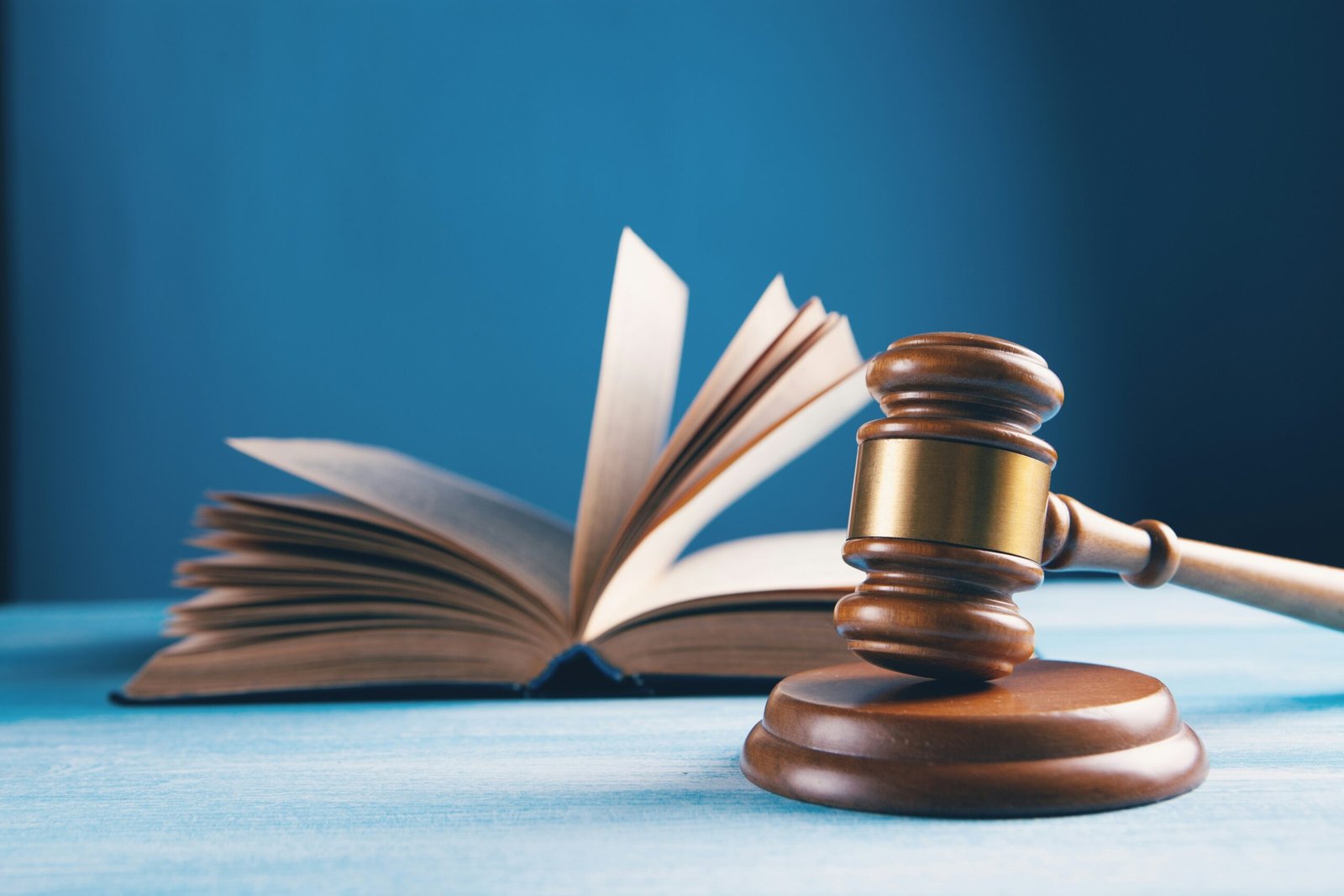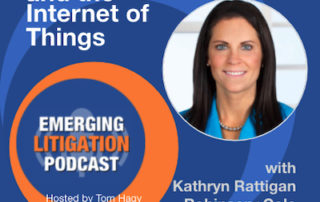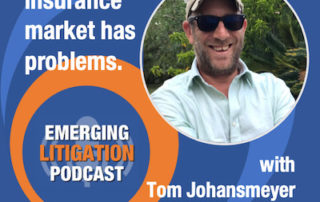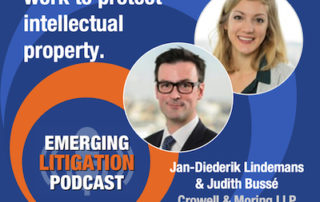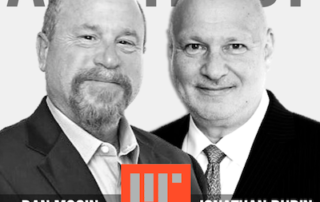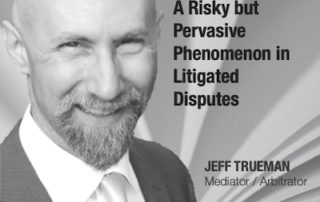Emerging Litigation Podcast
Broken Privilege and IoT with Kathryn Rattigan
Broken Privilege and IoT with Kathryn Rattigan Joining me to discuss this emerging area of law is Kathryn M. Rattigan, a member of the Business Litigation Group, the Data Privacy + Cybersecurity Team, and the Drone Compliance Team in the Rhode Island office of Robinson Cole. Kathryn provides clients guidance regarding privacy and data protection in connection with mobile devices, data storage technologies, mobile apps, and location-based services. She assists with the development of website and mobile app privacy policies and terms and conditions. Kathryn is a frequent contributor to the excellent Robinson Cole Data Privacy + Cybersecurity Insider blog. She holds a J.D. from the Roger Williams University School of Law and a B.A. (magna cum laude) from Stonehill College. This podcast is the audio companion to the Journal on Emerging Issues in Litigation, a collaborative project between HB Litigation Conferences and the Fastcase legal research family, which includes Full Court Press, Law Street Media, Docket Alarm and, most recently, Judicata. If you have comments or wish to participate in one our projects, or want to tell me how insightful and informative Kathryn is, please drop me a note at Editor@LitigationConferences.com. Finally, yes, "skeevy" is a word. And the law is not settled as to whether Shiloh has privacy rights. Tom Hagy Host of the Emerging Litigation Podcast There are now billions and billions of interconnected devices in the world with more coming online every day. Smart cars. Smart cities. Smart agriculture and so much more. Even our pets are connected. And you have to look no further than the Colonial Pipeline ransomware attack to see the real-world consequences of what criminals can pull off by connecting with things large and small. Worried about your privacy? Well. There is plenty to worry about. Fortunately we also have a lot of people fighting back on the technical, security, law enforcement, and legal [...]
The Cyber Insurance Market Has Problems: A Conversation With Tom Johansmeyer
The Cyber Insurance Market Has Problems: A Conversation With Tom Johansmeyer The author of the piece is my guest on our latest episode. He is Tom Johansmeyer, ARM, is head of PCS, a Verisk business. PCS investigates and provide, independent loss estimates on catastrophes and large individual losses to the benefit of the global risk and capital supply chain. Tom has focused on the broad and rapid expansion of PCS, leading the team into Japan, New Zealand, and other APAC regions in 2019 – as well as Mexico. Tom is the architect of the PCS entry into global specialty lines, most recently adding large risk loss reporting to the group’s portfolio. Previously, Tom held insurance industry roles at Guy Carpenter (where he launched the first corporate blog in the reinsurance sector) and Deloitte. Personally, I like his LinkedIn description: "Aspiring cyclist and distance swimmer, former soldier. Leading the global charge at PCS. Haven't driven anything with a motor since 2007." Excellent. This podcast is the audio companion to the Journal on Emerging Issues in Litigation, a collaborative project between HB Litigation Conferences and the legal news folks at Law Street Media, and the Fastcase legal research family, which includes Docket Alarm and Judicata. If you have comments or wish to participate in one our projects, or want to tell me how insightful our guests are, please drop me a note at Editor@LitigationConferences.com. You might notice that I misused a commonly used term, one specifically common in the world of insurance, or maybe you weren't paying that much attention. That would make two of us. Also, Tom J. was just a fun interview and I hope to get him back! I like the way he explained his candor at the end. He suffers from an infliction that I wish were a pandemic. I hope you enjoy it. Tom Hagy Host of the Emerging Litigation Podcast [...]
Putting an AI App to Work to Protect IP with Jan-Diederik Lindemans and Judith Bussé
Putting an AI App to Work to Protect IP with Jan-Diederik Lindemans and Judith Bussé They are Crowell & Moring partner Jan-Diederik Lindemans and Judith Bussé, both part of the firm’s Technology & Intellectual Property Department in Brussels. And, working with Neotalogic, they developed an interactive app that takes you through a set of attorney-crafted questions that, depending on your answers, take you to other questions. The app applies a layer of artificial intelligence to enhance the information gathering process. Listen to what these innovators had to say about the Crowell & Moring IP Check-Up application, and take it for a test drive yourself. Or, here is a quick video of someone using the app. This podcast is the audio companion to the Journal on Emerging Issues in Litigation*, a collaborative project between HB Litigation Conferences and the legal news folks at Law Street Media, and the Fastcase legal research family, which includes Docket Alarm and Judicata. If you have comments or wish to participate in one our projects, or want to tell me how insightful our guests are, please drop me a note at Editor@LitigationConferences.com. Tom Hagy Host of the Emerging Litigation Podcast * Highly regarded insurance and reinsurance industry attorney Laura Foggan of Crowell & Moring's Washington, DC, office is on the Editorial Advisory Board. Thanks to Laura for connecting me with J.D. and Judith. An organization’s intellectual property is often its most valuable asset. Whether it’s a patent or a trademark, a graphic design or proprietary market information, or just the unique way they do what they do, organizations must protect their innovations or risk significant damage to their future prospects. Assessing the vulnerabilities of such valuable inventory is as important as it is time-consuming. But a portfolio protection and process review involves answering the same long set of questions posed to any organization, no matter what type. There is the problem. You have a [...]
A Shameless Plug for Our Content Services
Your content marketing is everything you’ve ever dreamed of. Right?

Critical Legal Content was founded by Tom Hagy, former Editor & Publisher of Mealey’s Litigation Reports and VP at LexisNexis, founder of HB, current litigation podcaster and editor-in-chief. CLC’s mission is to help smaller firms and service providers not only create content — blogs, articles, papers, webinars, podcasts (like the stuff on this site) — but also to get it out there. How? Via social media, this website, your website, and potential via our podcast and journal which we publish in collaboration with vLex Fastcase and Law Street Media. The goal is to attract readers and dizzy them with your brilliance.
*Inspired by actual events.
Create content like a real legal publisher.
Emerging Litigation Journal
Full Ninth Circuit Removes Unwarranted Hurdles to Class Certification
The Authors Co-founding partner at MoginRubin LLP, Jonathan Rubin focuses his legal practice exclusively on antitrust and competition law and policy. Based in Washington, DC, he has litigated and led trial teams in major antitrust cases throughout the country. He has published in influential academic journals and has spoken to numerous professional groups, including the Directorate General for Competition of the European Commission, the Antitrust Section of the American Bar Association, and the American Antitrust Institute. Dan Mogin, founding and managing partner of MoginRubin LLP, concentrates his practice on antitrust, unfair competition and complex business litigation. He has served as lead counsel in numerous large antitrust cases, chaired the Antitrust Section of the California Bar, taught antitrust law and was editor-in-chief of a leading competition law treatise. Explore more from MoginRubin LLP! Blog: Emboldened by New Resources and Expanded Authority, Feds Continue 10-Year Look Back at Chinese Investment. By Dan Mogin, Jonathan Rubin, Jennifer Oliver, and Timothy LaComb. List OnDemand CLE Webinar: The Antitrust Case Against Google. Dan Mogin, Jonathan Rubin, Jennifer Oliver, Timothy LaComb, John Newman, Dr. Alan Grant Blog: FTC’s Case Against Facebook Will Test the Flexibility of U.S. Antitrust Law.Authors: Jonathan Rubin and Jennifer Oliver, MoginRubin LLP Blog: Full Ninth Circuit Removes Unwarranted Hurdles to Class Certification. Jonathan Rubin, Dan Mogin. Journal: Policy Derailed: Can U.S. Antitrust Policy Toward Standard Essential Patents Get Back on Track by Jonathan Rubin Webinar: Class Certification After Olean v. Bumble Bee with Jonathan Rubin, James Bogan lll, Jonathan Cohn, Bradley Hamburger. Journal: FTC v. Amazon: Market Definitions and Section 5 of the FTC Act Podcast: Algorithmic Software Facilitated Price Fixing with Jonathan Rubin Plus, additional insights from the MoginRubin Blog. Full Ninth Circuit Removes Unwarranted Hurdles to Class Certification “Nothing in Rule 23 suggests that the presence of more than a de minimis number of uninjured class members affects whether questions affecting only individual class [...]
Overconfidence: A Risky but Pervasive Phenomenon in Litigated Disputes
The Author Jeff Trueman (jt@jefftrueman.com) is an experienced, full-time mediator and arbitrator. He helps parties resolve a wide variety of litigated and pre-suit disputes and interpersonal problems concerning catastrophic injuries, wrongful death, professional malpractice, employment, business dissolution, real property, and domestic relations. Jeff is a past Director of Dispute Resolution for the Circuit Court for Baltimore City where he oversaw over 70 retired judges and senior attorneys conducting over 1,500 mediations, settlement conferences, and neutral evaluations per year. He is a Distinguished Fellow of the International Academy of Mediators, an invitation-only membership organization consisting of some of the most successful commercial mediators in the world. Interviews with leading attorneys and other subject matter experts on new twists in the law and how the law is responding to new twists in the world. Overconfidence: A Risky but Pervasive Phenomenon in Litigated Disputes “Lady Justice symbolizes fairness and impartiality as she oversees the adjudication process. Although she may hold the scales of justice in one hand, she also carries a large sword in her other hand. And she’s blindfolded. Knowing that, how confident should you be?” Abstract: “Overconfidence” may have negative connotations, but it can be beneficial in competitive situations like litigation where parties compete for resources. Nonetheless, posturing and overconfidence of opposing parties and counsel are common frustrations felt by lawyers and claims professionals. Most litigants fail to see themselves as overconfident even though that can result in miscalculations and erroneous risk assessments. Litigants can employ techniques to improve decision making but sometimes going to trial is considered the right decision for reasons that are considered more important than whether the result is better than the last settlement demand or offer. In addition to focusing on legal and financial threats that are external to themselves, litigants might also consider threats of their own [...]
Despite Relative Inactivity on the Virtual Front in Ukraine, Russia’s Global Cyber-Attacks are Coming
Editor Tom is HB’s Founder and Managing Director. His career in litigation content spans four decades during which he was editor, managing editor, and finally publisher at Mealey’s Litigation Reports. After Mealey’s was acquired by LexisNexis Tom became a vice president involved in creating new content and services at the legal research and services giant. He has always overseen or directly created articles, blogs, conferences, webinars, data collections, and now podcasts — all on litigation. Tom founded HB in 2008, and four years later he founded Custom Legal Content, a boutique content creation shop serving boutique and specialized legal practices and litigation services. In addition to his work at HB and CLC, Tom is Editor in Chief of the Journal on Emerging Issues in Litigation, and host of the Emerging Litigation Podcast. For years he was a leader in an international specialized publishing association, frequently speaking and writing about publishing, and is now active in an open community of content and event producers called Renewd. Sometime during the last millennium Tom proudly graduated with a B.A. in Communications from Bethany College in West Virginia. Interviews with leading attorneys and other subject matter experts on new twists in the law and how the law is responding to new twists in the world. Despite Relative Inactivity on the Virtual Front in Ukraine, Russia’s Global Cyber-Attacks are Coming Since his cyber-war capabilities seem to have worked well for him, why isn’t Vladimir Putin launching more cyber-attacks against Ukraine and its allies? Reports suggest he didn’t think he’d need them, plus they take time to execute. Other reports suggest he is trying to get some cyber damage on the scoreboard. Maybe the actual disruption to Ukraine from tanks and bombs, even though the Ukrainians aren’t giving him the satisfaction of a clean and easy parade-style invasion, could be redundant. But [...]





